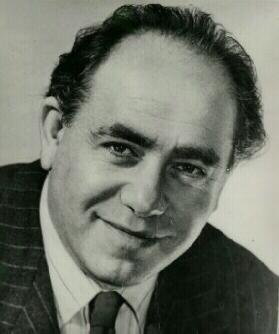Erich Zeisl (Erich Zeisl)

Born to a middle class Jewish family in Vienna, Erich Zeisl was the son of Kamilla (Feitler) and Siegmund Zeisl. His musical precocity enabled him to gain a place at the Vienna State Academy (against the wishes of his family) when he was 14, at which age his first song was published. While there, he studied with Richard Stöhr, Joseph Marx and Hugo Kauder. He won a state prize for a setting of the Requiem mass in 1934, but his Jewish background made it difficult to obtain work and publication. After the Anschluss in 1938 he fled, first to Paris, where he began work on an opera based on Joseph Roth’s Job, and then to New York City. Eventually he went to Hollywood where he worked on film music but increasingly felt isolated and ill at ease with the production-line demands of his employers. Among the films for which he wrote music were The Postman Always Rings Twice (1946), and Abbott and Costello Meet the Invisible Man (1951). Erich Zeisl’s style was essentially tonal, and conservative compared to contemporaries such as Arnold Schoenberg, and thus not totally unsuited to film music composition. But his heart lay elsewhere. At one stage he was employed to arrange the music for a highly inaccurate stage show about the life of Tchaikovsky, Song without Words.
Nonetheless Erich Zeisl was able eventually to find academic appointments and time to compose in his own style. These works included a variety of chamber music, a piano concerto, a concerto for cello (written for Gregor Piatigorsky), and a setting for choir, soloists, and orchestra of Psalm 92 in Hebrew, which he titled Requiem Ebraico (Hebrew Requiem), written in 1944-5 in memory of his father. A work of variations for orchestra was based on the Christmas carol “It Came Upon A Midnight Clear.” His opera Hiob (Job) was never completed. Zeisl was married to Gertrud Susanne (Jellinek). His daughter Barbara Zeisl Schoenberg married Ronald Schoenberg, the son of the composer Arnold Schoenberg. His grandson is lawyer E. Randol Schoenberg. Zeisl died of a heart attack while teaching in Los Angeles. Zeisl’s status as a proscribed musician under the Nazi regime has been one element in a revival of interest in his music, some of which is now available on CD. Premiere performances of the Requiem Ebraico were held in Israel (under the baton of Zubin Mehta) and in London in 2006.
Born
- May, 18, 1905
- Vienna, Austria
Died
- February, 18, 1959
- USA
- Los Angeles, California
Cemetery
- Hollywood Forever Cemetery
- Hollywood, California
- USA



